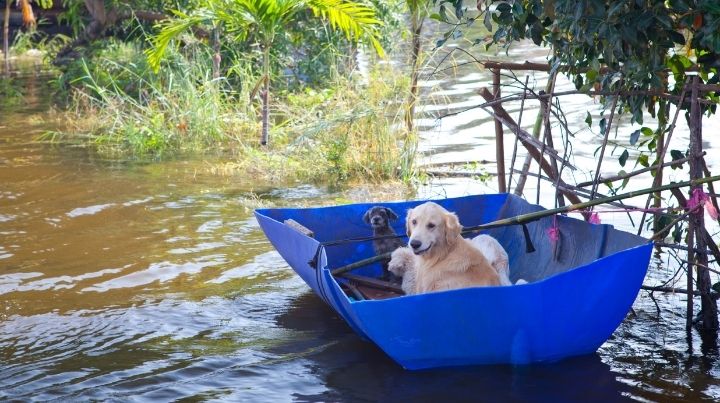How to Prepare for a Hurricane: A Prepper’s Guide

Hurricanes are one of the few natural disasters that give us several days of warning before unleashing their fury. Believe it or not, some people still wait until the last minute instead of spending that time getting ready for a hurricane. Then they wonder why they can't find supplies.
Of course, if you were one of those last-minute people, you wouldn't be reading this article about getting ready for a hurricane!
Will You Stay or Go?
First things first, you have to decide whether to stay and hunker down or to bug out. If you're bugging out, leaving as early as possible can help you avoid the inevitable gridlock of people fleeing at the last minute.
Some factors that will figure into your choice will be the type of structure you reside in, whether you live in a flood zone, and the category of the expected hurricane. We strongly recommend following the advice of local authorities when it comes to evacuation. Know that if you stay, particularly against official advice, you will be completely on your own.
Getting Ready for a Hurricane: What You Need
If you don't already have all your supplies on hand, your first step when getting ready for a hurricane should be to head to the store. Below is a quick list with links that go into more detail.
- Water
- Food
- Supplies to protect windows
- Emergency toilet supplies
- Bleach
- Hand sanitizer
- Bleach wipes
- Baby wipes
- Disposable plates and cutlery
- Emergency lighting
- Bug repellant
- A way to pass the time (games, puzzles, books, crafts, etc.)
- A backup phone battery pack
- An NOAA hand-crank radio
- Ice and coolers
- Prescription medications
- Digital thermometers for inside your refrigerator and freezer
- Cooling towels
What You Should Do Before a Hurricane Strikes
Spend your time wisely before a hurricane strikes. If you plan to shelter in place, do your shopping first because supplies will go quickly. After that, it's all about action.
Here are some of the steps you should take to get prepared.
Organize your supplies.
Having supplies won't do you much good if you can't find them when you need them. This is especially true when the power goes out in the middle of the night. Try using plastic tubs to organize different types of supplies so that you have “kits” for different needs: power outage, medical, sanitation, etc.
Keep a power outage kit where it's easy to find in the dark. Having a headlamp or flashlight in your bedside table and other strategic areas around your home is a great start so that you aren't stumbling around blind.
Prepare your home
Everyone's home is different, so preparations will vary. You should do the preparations marked with an asterisk whether you are evacuating or hunkering down.
- Reinforce your windows and doors as needed.*
- Cover glass from the outside to protect it. *
- If you live in an area that will get a storm surge or that is in a flood zone, move food and valuables to the highest level of the home. *
- Check on your insurance policy and make any necessary changes.*
- Decide which room in your home will be the safest place to ride out the storm. You want to be in an area without big windows. If you live in a flood or storm surge zone, you'll want to be on a high floor. If you live in an area where flooding is unlikely, the ground floor is safer. If possible, choose a location in the middle of the house.
Here is more advice about preparing your home for a hurricane.
Prepare your property
There are also things you should do to prepare your yard and property for the advent of the storm. You should do these things whether you are staying or going.
- Remove any dead or precarious limbs hanging over your house.
- Assess the things outside your home. Bring in lawn furniture, tools, and toys – they can become airborne in the high winds and cause damage to your property or a neighbor's. Even worse, they could harm someone.
- If there are things you can't bring inside, secure them to something solid like a large tree or a support column.
Be ready for a power outage
Most hurricanes result in widespread power outages and happen in hot weather. The following steps can help mitigate loss and discomfort.
- Fill empty plastic bottles and jugs 3/4 of the way with water, then freeze them, using up every bit of space in your freezer. When the power goes out, you can transfer some of those containers to your refrigerator and use it as a giant cooler. Bonus: when they melt, you have refreshing cold water to drink.
- Once they are frozen, place a coin inside one container and make sure it sits flat. This will help you to determine how long the power was out if you leave. If you return to find that the coin is frozen at the bottom of the vessel, it means that everything in your freezer thawed out then refroze and may not be safe to eat.
- Use these food safety guidelines to help you decide if your refrigerated and frozen goods are still okay to consume or should be discarded. It's awful to have to throw away food, but it's worse to get food poisoning in the middle of an emergency. This is where your digital thermometers will come in handy.
- Be on the lookout for heat-related illnesses and treat them quickly.
- Keep more comfortable with measures like tepid baths, cooling towels, and battery-operated fans.
- Have ways to pass the time if the power goes out, and heaven forbid, your teens have to be without their devices for a few days.
- Make sure you have an NOAA hand-crank radio so you can get the latest reports and essential information.
- Have emergency lighting. Consider glow-bracelets for children.
Getting Ready for a Hurricane with Pets
Every year, you read about people who evacuate due to a hurricane but leave their pets behind. Sometimes the animals are chained up outdoors and left to drown, and sometimes they're abandoned inside. If it's bad enough that YOU need to evacuate, your animals need to also be evacuated. They are your responsibility.
Plan ahead by having a copy of their veterinary records, particularly vaccinations. This way, if you have to board them in a kennel when you evacuate, you'll have everything you need. (Your vet's office will probably be closed and unable to help you with records.)
Look for pet-friendly hotels outside your area. Motel 6 and La Quinta are pet-friendly chains. Be sure to call and confirm before making your reservation that your pets are welcome. Other hotels may be pet friendly too, but they vary by location. Some hotels charge a nightly pet fee. During emergencies, you'll find that some hotels will loosen their restrictions, but always confirm this ahead of time. Don't try to sneak your pet into a place that doesn't allow them. The last thing you need is to get kicked out in the middle of the night because your dog barked at someone in the hall. Another option is searching pet-friendly AirBnBs in the area to which you plan to evacuate.
If you are hunkering down, make sure you are supplied with your pets' food, any medications, and comfort items. You may also wish to get extra kitty litter and toileting items like puppy pads for dogs. Going out in a severe storm is dangerous for both you and your pet.
The Bottom Line on Getting Ready for a Hurricane
The bottom line on getting ready for a hurricane is that it's all about choices. Will you stay or go? Where and when will you go if you leave? What supplies do you have, and what do you need?
The earlier you begin getting ready for a hurricane, the better off you'll be. Supplies will still be plentiful, and you'll beat the traffic by starting before those who wait until the last minute.
Have you ever been through a hurricane? What advice do you have for those who are getting ready for a hurricane? Let us know in the comments.
Additional Resources:
- What Should You Do AFTER a Hurricane
- Do you have an emergency binder? Here's what you need to know!
- How to Survive a Tornado: 6 Tips to Keep Your Family Safe
- Weather Preparedness Is About More Than Just Storms
FREE Guide
Read the Best Seller
Join Mind4Survival
Stay informed by joining the Mind4Survival! 100% Secure! 0% Spam!
Affiliate Disclosure...
Mind4Survival is a free, reader-supported information resource. If you make a purchase through our link, we may, at no cost to you, receive an affiliate commission.




